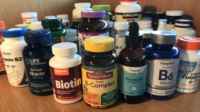Our Members Asked:
Can prenatal vitamins have too much folic acid? Mine has 800 mcg, but isn't that more than what's recommended? Is this dangerous to me or my baby?

Answer:
Prenatal vitamins can have too much folic acid and there is potential risk associated with this. At the same time, it is very important that you take a supplement with folic acid if you are planning to or could become pregnant.
The importance of folic acid during pregnancy
Folic acid is a synthetic form of the B vitamin folate (B9) which naturally occurs in foods, such as dark green leafy vegetables and oranges. Folic acid is absorbed much better (about 70% better) than natural folate from foods.
Folate (particularly as folic acid) can help reduce the risk of your baby having a birth defect relating to the spinal cord or brain. The crucial period for supplementing with folic acid starts at least one month before conception and continues through the first two to three months of pregnancy (US Preventative Services Task Force 2023).
It is recommended that women who may become pregnant get 400 mcg (up to 800 mcg) daily of folic acid or another synthetic form of folate known as methylfolate. Be aware that the labels on supplements show not only the amount (in micrograms or mcg) of folic acid, but also the equivalent units of dietary (natural) folate, so 400 mcg of folic acid will also be shown as about 667 mcg DFE (dietary folate equivalents). Similarly, 800 mcg of folic acid will be listed as about 1,360 mcg DFE.
Too much folic acid
You can get too much folic acid -- although there is not a limit on intake of natural folate from fruits and vegetables. The Tolerable Upper Intake Level (UL) for folic acid from supplements and fortified foods is 1,000 mcg per day – this also applies to methylfolate.
It's best not to exceed the UL because prolonged intake of excessive folic acid can cause kidney damage and can complicate the diagnosis of vitamin B-12 deficiency (folic acid supplementation can mask a symptom of vitamin B-12 deficiency).
Getting adequate folate during pregnancy may reduce the risk of autism. However, excessively high blood levels of folate (>59 nmol/L) in pregnant women has been associated with an approximate twofold increased risk of autism in their children, according to an observational study in Baltimore in which 10% of women exceeded this level (Raghavan, International Meeting for Autism Research 2016). In addition, one study found that taking 800 mcg or more of folic acid from supplements during the month before pregnancy through mid- pregnancy was associated with a 32% increased risk of gestational hypertension (high blood pressure in women during pregnancy).
Getting 400 mcg to 800 mcg of folic acid won’t put you over the UL unless you are also getting 200 mcg or more of folic acid from other supplements or fortified foods. However, manufacturers tend to put in extra folic acid (30% or more is not uncommon) to make up for a loss of folic acid due to degradation during a product’s shelf life, so it's possible that a supplement that lists 800 mcg of folic acid could have more than the UL. For this reason, you may be better off taking just 400 mcg to 600 mcg of folic acid (667 to 1,020 mcg DFE), and be sure that you are eating a well-balanced diet providing some additional folate.
Other important ingredients in prenatal vitamin
Some of the other nutrient requirements that increase during pregnancy are for iodine (220 mcg) -- you need 220 mcg rather 150 mcg normally, and iron – you need 27 mg, up from 18 mg. Choline is also important and you should try to get 200 to 400 mg from a supplement.
Many general multivitamins for younger women provide some folic acid, iodine and iron, but typically not as much as you need for pregnancy, and few provide much choline, so a prenatal vitamin would be better before and during pregnancy.
ConsumerLab.com has tested and compared many prenatal supplements and other multivitamins for women, men, and children. See ConsumerLab.com’s Multivitamin Review for our tests and comparisons and our current Top Picks.
Join today to unlock all member benefits including full access to all CL Answers and over 1,400 reviews.
Join NowAlready a member? Sign In Here.
Join now at www.consumerlab.com/join/










Submit your comment
This feature is restricted to active members.
Join now to add comments and get all member benefits, including over 1,400 reviews.
Join NowAlready a member? Sign in here.